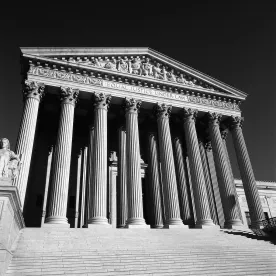Yesterday, the Supreme Court confirmed a more expansive application of criminal insider trading violations when it unanimously affirmed the Ninth Circuit Court of Appeals decision in Salman v. United States. In doing so, the Court upheld the insider trading conviction of a defendant who bought and sold securities with the benefit of inside information that he received as a gift. The Court concluded that the defendant (the “tippee”) could be convicted when his relative (the “tipper”) personally benefited even though he did not receive anything of tangible value when he made a gift of confidential information.1 This decision is consistent with the Court’s earlier decision, Dirks v. SEC, wherein the Court established the “personal benefit” requirement for Rule 10b-5 insider trading violations.2 In Dirks, the Court explained that a “personal benefit” exists when “the insider personally will benefit, directly or indirectly from his disclosure,” and further that a personal benefit can be derived from “a gift of confidential information to a trading relative or friend.”3
The Salman decision, the first insider trading case the Court has heard in two decades, is significant because it resolves a Circuit split that had developed post-Dirks. Specifically, while Salman’s appeal was pending at the Ninth Circuit, the Court of Appeals for the Second Circuit decided United States v. Newman, which dramatically restricted potential insider trading prosecutions by holding that a tipper and tippee must have an “exchange that [was] objective, consequential, and represent[ed] at least a potential gain of a pecuniary or similarly valuable nature.”4 In other words, the fact that a tipper gifted information to a close relative or friend was not enough to show a “personal benefit”—there also needed to be proof of some tangible benefit provided by the tippee to the tipper. Shortly after Newman, the Ninth Circuit issued its opinion in Salman,5 which declined to follow the Second Circuit and affirmed Bassam Salman’s conviction based solely on evidence of a close familial relationship between the tipper/tippee, without further evidence of any tangible gift or benefit.
With its decision yesterday, the Supreme Court has cleared up the Circuit split, explicitly finding Newman’s tangible benefit requirement to be inconsistent with Dirks and returning the government’s burden in insider trading cases back to the former pre-Newman status quo.6 The Court’s ruling represents a practical recognition and application of the facts in Salman (and many other insider trading cases), where the tipper and tippee are close relatives (or friends).7 If the Court had agreed with Newman’s tangible benefit requirement – applied to the facts in Salman – it would have permitted insiders to gift confidential information to family members and friends, who could subsequently trade without liability as long as the government could not show a tangible exchange in return to the tipper. Such a requirement would have significantly limited the government’s ability to successfully prosecute insiders who share confidential information and their beneficiaries.
1 Salman v. United States, No. 15-628, slip op. (U.S. Dec. 6, 2016).
2 Dirks v. SEC, 463 U.S. 646 (1983).
3 Id. at 660-664.
4 United States v. Newman, 773 F.3d 438 (2nd Cir. 2014), cert denied, 136 S. Ct. 242 (2015).
5 United States v. Salman, 792 F.3d 1087 (9th Cir. 2015).
6 Given the facts of Newman, this decision likely does not change the outcome of that case.
7 In Salman, the insider, Maher Kara, tipped off his brother, Michael Kara, who in turn tipped a brother-in-law, Bassam Salman.



 />i
/>i

